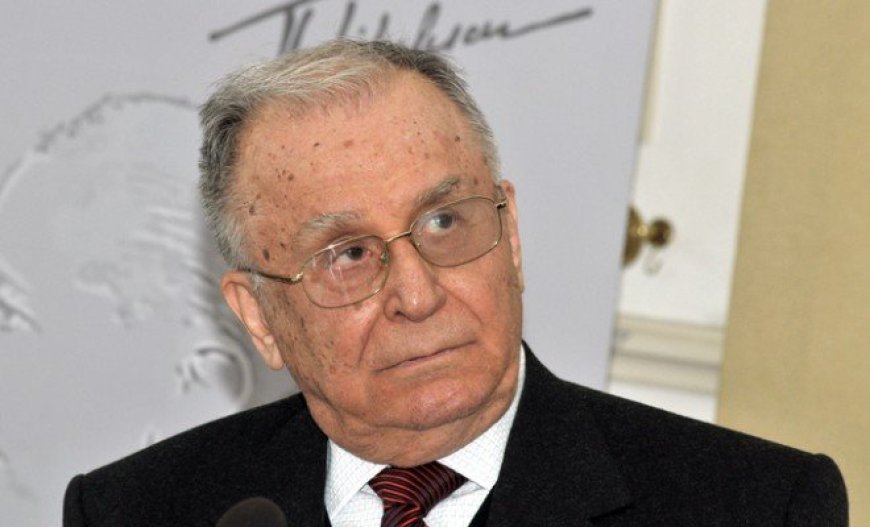Romania Mourns Ion Iliescu: Former President and Key Architect of Post-Communist Democracy Dies at 95
Romania’s former President Ion Iliescu, who led the country through its post-communist transition, has died at age 95. Explore his political legacy, impact on democracy, and national response.

Bucharest, Romania — Romania is mourning the death of one of its most pivotal political figures, Ion Iliescu, the nation’s first president after the 1989 overthrow of communism. He passed away at the age of 95, as confirmed by the Romanian government in a statement issued roughly eight hours ago. His passing marks the end of a historic chapter in Eastern European politics and the nation’s turbulent journey from dictatorship to democracy.
A Symbol of Post-Communist Transition
Ion Iliescu was more than just a political figurehead; he was the face of Romania’s revolution. Born in 1930 in Oltenița, he rose through the ranks of the Romanian Communist Party before breaking from the regime of Nicolae Ceaușescu, whom he eventually helped depose during the Romanian Revolution of 1989.
Following the revolution, Iliescu emerged as a leader of the newly formed National Salvation Front (NSF). He was appointed interim president and later elected Romania’s first democratically chosen president, serving from 1990 to 1996 and again from 2000 to 2004.
Mixed Legacy of Reform and Controversy
While many remember Iliescu as a stabilizing force during a chaotic transition, his legacy is marred by ongoing debate. His critics cite the violent suppression of protesters during the early 1990s and alleged involvement in the 1990 Mineriad, when miners from the Jiu Valley were summoned to Bucharest to quell anti-government protests. Although charges were brought against him in recent years, they were eventually dismissed, leaving many questions unanswered.
Supporters, however, argue that Iliescu was essential in steering Romania away from dictatorship and guiding it into the international community. His terms saw the drafting of a new constitution, greater press freedoms, and eventual accession into NATO and the early stages of European Union integration.
“Ion Iliescu’s death marks the passing of an era in Romanian politics. Whether one agreed with him or not, his impact on our nation’s direction is undeniable,” said political analyst Adriana Radu in a televised statement.
International Reaction and Funeral Arrangements
Condolences poured in from across Europe and beyond. European Commission President Ursula von der Leyen extended sympathies, noting Iliescu’s role in bringing Romania closer to European values. Neighboring countries also expressed their grief, citing his instrumental role in regional stability during the post-Soviet transition period.
A state funeral is expected to take place in Bucharest later this week, with full military honors. The Romanian flag has been lowered to half-mast at all government buildings, and a three-day mourning period has been declared nationwide.
The Final Years
Following his retirement from politics in 2004, Iliescu largely withdrew from public life. He remained active as an honorary member of the Social Democratic Party (PSD) and occasionally commented on political affairs. In recent years, his health had declined, and he had been hospitalized multiple times. Despite this, he continued to symbolize a critical turning point in Romanian history.
Historical Impact on Romanian Democracy
Ion Iliescu’s death has reignited conversations around the fragile nature of democratic reform in post-communist states. His journey—marked by revolutionary change, hard decisions, and contested governance—mirrors the experience of many nations that broke free from Soviet control.
Some historians argue that Iliescu’s approach set a precedent for peaceful democratic transitions in the Balkans. Others caution that his governance revealed the difficulty in deconstructing entrenched authoritarian structures without falling into new forms of centralized power.
Public Sentiment: A Nation Reflects
In central Bucharest, makeshift memorials have appeared outside the Presidential Palace, where citizens placed flowers and candles in remembrance.
“I was just a student when Iliescu came to power. He gave us hope when everything seemed broken,” said Cristian Popa, a 61-year-old former teacher.
“He wasn’t perfect, but he was ours.”
While younger generations might see Iliescu as a historical figure in textbooks, for millions of Romanians, his voice echoed through the most uncertain days of their lives.
Conclusion: A Nation at a Crossroads Once Again
The passing of Ion Iliescu is more than a national obituary—it is a moment of reckoning. As Romania continues to evolve politically and economically within the European Union, Iliescu's death invites reflection on how far the nation has come—and the road still ahead.
His leadership, both celebrated and criticized, undeniably carved a path for democratic evolution. As flags fly at half-staff and Romania pauses to remember, one thing is clear: Ion Iliescu's legacy will continue to shape conversations about democracy, governance, and identity in Eastern Europe for decades to come.











